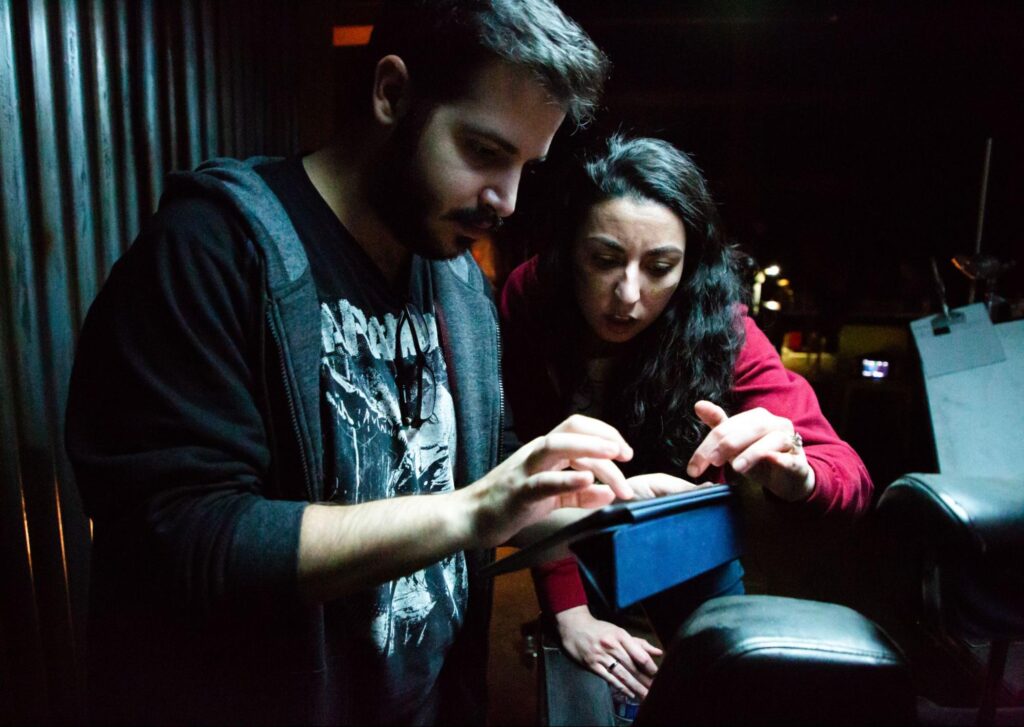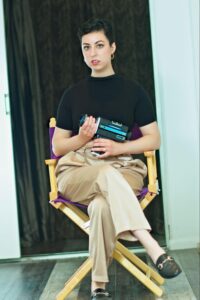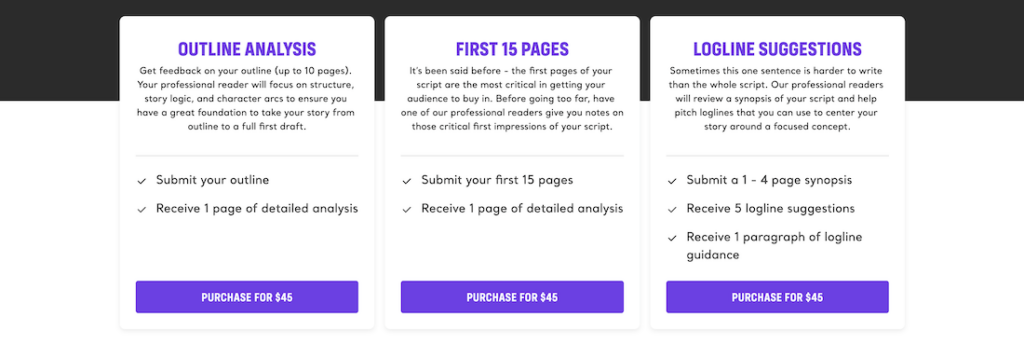A rare white whale in the film and TV industry is transparency. Its lack keeps many gates in this business tightly shut to outsiders. So, dear reader, I aim to be as transparent as possible with you. If we’re going to create a more inclusive industry, we must all do our part, and this is mine. I hope that my story can assist you in crafting your unique journey into screenwriting.
Early Career
It took me 15 years from the moment I decided to become a filmmaker to achieve tangible industry success. Yes, 15 years, and I had a lot of help along the way. I was fortunate to have parents who actively encouraged my dream, and I received a thorough film education that spanned high school through graduate studies. I worked various industry jobs—everything from production assisting to assistant directing—sometimes only for a credit.
On paper, I did everything one is “supposed” to do to attain their dream job, which for me was becoming a screenwriter and director. These steps theoretically should have created a clear map of where I was to go next. Yet, when I arrived in Los Angeles as a fresh-faced post-grad, I found myself more lost in my career than ever.

Filmmaker Ariel Sinelnikoff and actor Ilir Fiora
Moving to Los Angeles
I immediately put my nose to the pavement when I arrived in LA, desperately trying to acquire any job I could in the industry. I naively thought that maybe I could work for someone who would put my short films in front of an executive, and the rest would be smooth sailing.
While this happens for a lucky few, the types of jobs I found were far from what I’d hoped. I was so laser-focused on looking successful that I lost sight of what my definition of “success” actually was. If I had just paid attention to what my creative soul and brain needed at that time, I would have quickly come to the conclusion that I was beyond burnt out and needed a break to write and create.
The Pandemic as a Turning Point
Fate swiftly intervened and gave me that break I needed. The pandemic hit eight months after I moved to LA. As someone with chronic illness who mostly had on-set production experience on my resume, it was difficult to find a job that I was both qualified for and was safe. So I wrote. I wrote like hell.
Admittedly, it took a few months to climb out of the depression that engulfed me in those early pandemic days. But by the spring of 2020, I promised myself that I would finish my first feature screenplay by the end of quarantine.
Read More: Script to Scream: The Best Horror Movie Scripts You Can Read (If You Dare)
Honing My Writing Process
I knew to expect a tangible script that could further my career when I made that vow to myself. What wasn’t expected was something potentially even more valuable: writing my first feature made me hone my writing process. Before the pandemic, I hadn’t thought much about my process beyond forcing myself to sit down and just… write. What I discovered about myself and my process has stayed with me.
The most illuminating aspect I discovered about my process was how spiritual writing inherently is. I’m not talking about religion; I’m talking about how there is an inextricable link between the written word and one’s soul. No matter the story, the characters, or the plot—you, as the writer, are telling a story from your unique perspective. Everything in your life, from your beliefs, philosophies, and experiences, will color how you tell the story you are writing and determine why you are writing it in the first place. While I could articulate part of this concept before writing my first feature (now called It Clings To Her), I internalized it while writing those first few drafts.

‘Catfight’
A very personal project for me, It Clings To Her is a supernatural horror film that has forced me to face some of my inner demons, catalyzing a major reckoning within myself. Writing it reminded me of why I gravitate towards the horror genre in the first place: horror allows me to process my innermost fears in an extremely cathartic manner. The only way to describe the experience I’ve had writing this screenplay is spiritual, for it stirred my spirit in ways I am forever grateful for.
Beyond my spiritual connection to writing, I discovered incredibly practical elements to my process. While writing the first draft, I got too in my head about everything needing to be “perfect,” when, in reality, I just needed to get the story on the damn page. So, as a way to reverse-psychologize myself, I started calling the first drafts of scripts “crap drafts” as a way to give myself permission for them to be bad. It worked. Suddenly, I flew through pages, understanding that they could be revised later. I also learned that music is essential to my process, but only instrumental music, as lyrics will distract me too much. Exercise became another must for my process, as it keeps my body from atrophying while sitting at my laptop all day and keeps my mind sharp (a shocking revelation that my sports-averse self is still digesting).
While I’ve slowly added to my process over the past few years, these are the essentials. They aren’t fancy or complicated. They’re accessible to me and pretty much anyone, which is what makes them so effective. The proof of their effectiveness is in the pudding. Today, I’m well past that initial “crap draft” of It Clings To Her, and have just finished the thirteenth draft. I could not have done this without the time I was afforded to explore both the story and who I was as a writer.
My ScreenCraft Experience
A few drafts into It Clings To Her, I knew I was ready to do something with it. Despite prior warnings from professors who claimed that screenplay competitions were “scams” (in all fairness, some are), I decided to take the leap and enter several competitions. Within a few months, I made the quarter and semifinals of a few but didn’t see much traction beyond my Coverfly ranking slowly rising.
Enter the 2022 ScreenCraft Horror Competition. By the time I was ready to enter, I’d become well-acquainted with ScreenCraft. My graduate thesis that I co-wrote, Catfight, had made the semifinals of both 2018 ScreenCraft Film Funds, and It Clings To Her had advanced in a couple of their other competitions. But the Horror competition was the one I was gunning for.

Filmmaker Ariel Sinelnikoff and Script Supervisor Tony Clemente
ScreenCraft had brought some of my horror idols, such as Ari Aster, on as judges in years prior, and I knew that if I made the finals, I would be accepted into their Development Program. So, I entered and opted in to receive coverage, as this was a genre-specific competition. Despite receiving some disheartening notes, it was extremely helpful in revealing what was and what wasn’t landing with readers.
However, I thought I would be lucky if I even made it to the semifinals based on the feedback I received. So imagine my shock when I discovered that I had won Best Feature Script. Luckily, the ScreenCraft team saw the potential of It Clings To Her, both as a winner and a film they believed could be made. While I’ve had a lot of folks believe in my work throughout the years, ScreenCraft telling me that I’d won helped me believe in myself at a time when I needed it most.

‘Catfight’
By the time I won the horror competition, I had already begun working with the ScreenCraft team as a newly-inducted member of their Development Program for finalists. ScreenCraft executive Cameron Pinches worked one-on-one with me to develop actionable next-step career goals. I knew I wanted to get representation, but I also wanted to direct It Clings To Her. It’s rare in this industry that folks are encouraged to direct their first feature, as it’s a massive feat for even the luckiest and most talented to accomplish. However, Cameron was beyond encouraging.
He believed I was ready to leap from writing and directing shorts to making features. We decided together that he’d help me find a manager who could help me get my film produced. We talked about the type of manager I was looking for—one that’s hands-on with developing new projects with their clients—and within a few short weeks, Cameron had a meeting set up with Jeff Portnoy at Bellevue Productions.
Jeff and I hit it off immediately. He was the exact kind of manager I was looking for (down to our shared love of David Lynch films). As it turned out, Jeff was looking for a female horror filmmaker to represent.
Today, he and I are developing our second feature together (my third total), and he found me a wonderful entertainment attorney to add to my team. The best part? Jeff introduced me to producer Kim Sherman and Company X, who are now producing It Clings To Her with me attached to direct.
Read More: 5 Takeaways From a Conversation With Horror Master C. Robert Cargill
ScreenCraft Opening Doors
My journey with ScreenCraft—from submitting It Clings To Her to its first competition to the ScreenCraft team successfully getting me repped—taught me that there is so much more to screenwriting than just talent.
With countless incredible writers in the world, every single talented writer would be working in their desired field if it were only about talent. The other less glamorous elements of success are timing and patience. I’d be lying if I said I didn’t think about quitting after not making it past the semifinals during my first couple of ScreenCraft submissions. I got impatient, as we all do at some point. But when I won the horror competition, I learned that the perfect manager for me was specifically looking for a horror writer when I realized that the women who are now producing It Clings To Her understood the story better than anyone else who had read the script.
I experienced a rare feeling: I felt like I was in the exact right place at the exact right time. It was a relieving experience surrendering to the idea that half the battle is timing. While it may be scary, trusting in that timing and patience will open many doors for you, creatively and mentally.

Ariel Sinelnikoff
Final Thoughts
While I’ve had many experiences in this industry as a writer and director, I know I am still early on in my journey. I’ve learned countless valuable lessons, but many more yet to come. If you’re reading this, I’d wager you’re at the beginning of your journey, too, and I am so thrilled for you. You often don’t realize how exciting of a time the beginning of something is until it’s over, so I encourage you to revel in this moment.
I offer you my experiences—the successes, the blunders, and everything in between—as a guide to glean from, not a map to follow precisely. Your journey will be uniquely yours, no matter how much you attempt to model it after others (as I have been guilty of doing). So visit some of the stops I’ve been to if it suits you. Skip the ones that aren’t aligned with you. Bask in the moments that feel extraordinary because they are rare.
Make writing not just about career milestones. Chase after the stories that get your heart beating, help you untangle something within yourself, and speak to your soul. But, at the end of the day, bravely draw up your own beautiful map. I’m rooting for you.
Read More: How Screencraft Comedy Competition Winner Destiny Macon Is Navigating Hollywood
CHECK OUT OUR PREPARATION NOTES SO YOU START YOUR STORY OFF ON THE RIGHT TRACK!

Ariel Sinelnikoff
Molded by the gruesome horror films she watched at far too young an age, Ariel Sinelnikoff is a screenwriter and director who has dedicated herself to alchemizing life’s grim realities into hyper-stylized genre films. Exploring issues such as women’s and LGBTQ+ rights in her critically acclaimed short films and screenplays, Ariel’s work investigates the junction between beauty and the macabre to create stories of uniquely (and often messy) human experiences.
She is currently developing her supernatural horror feature It Clings To Her, which has amassed over a dozen accolades, including winning the 2022 ScreenCraft Horror Competition, making the semifinals of the 2021 Austin Film Festival, and being named the #1 Horror script on Coverfly’s Red List in 2022. Ariel is represented by Jeff Portnoy of Bellevue Productions and Marios Rush. You can follow her work at www.arielsinelnikoff.com.
The post How ScreenCraft Horror Competition Winner Ariel Sinelnikoff Is Bringing Her Story to the Silver Screen appeared first on ScreenCraft.
Go to Source
Author: Ariel Sinelnikoff

